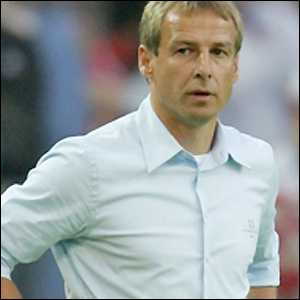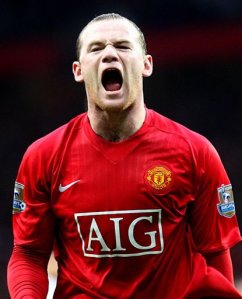Amazingly, Manchester United came back from 2-0 down to draw with Aston Villa 2-2 at Villa Park. But United were lucky: Villa attacked from the beginning and outplayed United the entire match. Which means, of course, that the English media and a lot of US columnists will wring their hands. So, let’s step back and see the pros and cons of pushing the panic button.
Reasons to push the button:
1. No wins away from home. United have been in positions to score, but haven’t been able to finish teams off. Why is that? Perhaps it’s complacency, but I think it has more to do with lack of squad depth and disharmony.
2. No reinforcements. Wayne Rooney’s hissy fit last month brought into relief the lack of spending. In principle, I understand Sir Alex’s desire not to overspend. In reality, he clearly has no money to spend. It appears as though the Glazer takeover debt is finally coming home to roost.
3. No speed and no creativity. Let’s get one thing straight: Nani will never, ever be a consistent performer (unless that performance is dramatizing fouls). Park Ji-Sung is a nice player with plenty of industry, but he’s not going to float beautiful crosses. The speed comes into play at the back. Having one center back with no speed is fine; two is too many. Add to that the fact that the left and right backs have neither the speed nor the skill to keep up with Aston Villa and United has major problems.
4. Poor transfer decisions. Bebé for 7 million? Smalling for 10 million? No move for Özil at a cut-rate price? No move for van der Vaart, available on the cheap?
5. Playing not to lose, rather than playing to win. In the Manchester derby, United adopted a defensive posture despite controlling large portions of the second half. Against Villa, United was attacked from the beginning and had no response (at least until Macheda’s laser in the 81st minute, which appeared to flick a switch in the team). It looks like United is rattled, and that’s not a good thing for such an ambitious club.
Reasons not to press the panic button:
1. Sir Alex Ferguson still runs the show. Twenty-four years in charge with amazing success means he has a lot of leeway.
2. An ability to come back from the brink. United have an amazing ability to come back. In the match today against Villa, they came back from 2-0 down. They’ve done that more than once this season alone. Perhaps it’s not complacency, but an unwillingness to fight until it’s absolutely necessary (which may, in fact, be a bigger problem).
3. The kids might actually be okay. Gabriel Obertan looks like he’s developing (which only took about three years). Federico Macheda’s development curve, on the other hand, looks like the last two years of the Dow Jones index. Javier Hernández was an excellent piece of business. The downside? None of those are defenders or creative wing players.
By numbers, the cons outweigh the pros, but I’m still not ready to push the panic button. United will not win the league this year (barring some major changes in January, which aren’t going to happen) but all is not lost. At least not yet.






